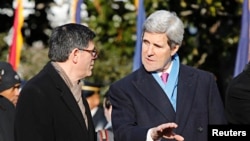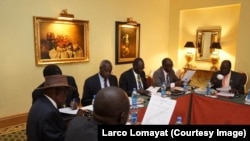South Sudanese government officials and rebels said Tuesday in separate interviews that the threat of U.S. sanctions did not worry them because their side was neither blocking the peace process nor responsible for the violence that has consumed the country for nearly four months.
Foreign Affairs Ministry spokesman Mawien Makol Arik told VOA that the executive order signed late Thursday by U.S. President Barack Obama was unnecessary and could damage relations between Washington and Juba.
“The government has not violated any human rights. Instead, it is the government protecting civilians," he said.
"For the U.S. to put sanctions on things that have no tangible proof, we are saying as a government, this is not good. It will not be good for the two countries, the United States and South Sudan,” Arik said.
The executive order threatens to freeze the assets of and impose travel bans to the United States on anyone found to have committed or fomented violence in South Sudan, to have undermined peace and security in the country, or to have blocked the peace talks. Jack Lew, the Treasury Secretary, and Secretary of State John Kerry will determine who will have sanctions imposed on them.
Although the order names no one specifically, it does say that leaders of "an entity, including any government, rebel militia, or other group, that has, or whose members have engaged in" any of the blacklisted "activities" will face sanctions.
A spokesman for anti-government forces allied to former vice president Riek Machar said the U.S. threat of targeted sanctions would not impact anyone on the rebel side.
"We are not worried. We have not been obstructing the peace process," Brigadier General Lul Ruai Koang told VOA in an interview by satellite phone from Addis Ababa, where talks to end South Sudan's four-month-old conflict have been put on hold until the end of this month. "It is the government that should be worried."
Peace talks, which began in January, have achieved little other than a cessation of hostilities agreement that has been repeatedly violated since it was signed, and a demand to expedite the release of 11 politicians who were detained when fighting broke out on December 15.
Seven of the political detainees were released to the custody of Kenyan officials but four others remain in detention and are currently appearing before a special court in Juba to determine if the government can bring treason charges against them.
Ruai said the peace talks stalled because government negotiators refused to allow the freed political detainees to have a place at the negotiating table.
"The government keeps on changing the rule book whenever a solution is about to be found," he said.
Ruai also blamed government forces for violating the cessation of hostilities agreement by attacking rebel-held positions.
Meanwhile, government spokesman Arik said South Sudanese Foreign Affairs Minister Barnaba Marial Benjamin has been talking to officials at the U.S. embassy in Juba, trying to convince them to rescind the executive order or, at the very least, not to implement it.
Although no official death toll has been released, thousands are thought to have died in the fighting in South Sudan and more than a million have been forced from their homes.
Some 800,000 are believed to be internally displaced, with tens of thousands sheltering inside U.N. bases and compounds; approximately 250,000 have fled to to neighboring countries. U.N. agencies have warned that more than a third of South Sudan's population of nearly 11 million faces face severe food insecurity and, unless the fighting stops soon, the country will likely face "unprecedented suffering."
Foreign Affairs Ministry spokesman Mawien Makol Arik told VOA that the executive order signed late Thursday by U.S. President Barack Obama was unnecessary and could damage relations between Washington and Juba.
“The government has not violated any human rights. Instead, it is the government protecting civilians," he said.
"For the U.S. to put sanctions on things that have no tangible proof, we are saying as a government, this is not good. It will not be good for the two countries, the United States and South Sudan,” Arik said.
The executive order threatens to freeze the assets of and impose travel bans to the United States on anyone found to have committed or fomented violence in South Sudan, to have undermined peace and security in the country, or to have blocked the peace talks. Jack Lew, the Treasury Secretary, and Secretary of State John Kerry will determine who will have sanctions imposed on them.
Although the order names no one specifically, it does say that leaders of "an entity, including any government, rebel militia, or other group, that has, or whose members have engaged in" any of the blacklisted "activities" will face sanctions.
A spokesman for anti-government forces allied to former vice president Riek Machar said the U.S. threat of targeted sanctions would not impact anyone on the rebel side.
"We are not worried. We have not been obstructing the peace process," Brigadier General Lul Ruai Koang told VOA in an interview by satellite phone from Addis Ababa, where talks to end South Sudan's four-month-old conflict have been put on hold until the end of this month. "It is the government that should be worried."
Peace talks, which began in January, have achieved little other than a cessation of hostilities agreement that has been repeatedly violated since it was signed, and a demand to expedite the release of 11 politicians who were detained when fighting broke out on December 15.
Seven of the political detainees were released to the custody of Kenyan officials but four others remain in detention and are currently appearing before a special court in Juba to determine if the government can bring treason charges against them.
Ruai said the peace talks stalled because government negotiators refused to allow the freed political detainees to have a place at the negotiating table.
"The government keeps on changing the rule book whenever a solution is about to be found," he said.
Ruai also blamed government forces for violating the cessation of hostilities agreement by attacking rebel-held positions.
Meanwhile, government spokesman Arik said South Sudanese Foreign Affairs Minister Barnaba Marial Benjamin has been talking to officials at the U.S. embassy in Juba, trying to convince them to rescind the executive order or, at the very least, not to implement it.
Although no official death toll has been released, thousands are thought to have died in the fighting in South Sudan and more than a million have been forced from their homes.
Some 800,000 are believed to be internally displaced, with tens of thousands sheltering inside U.N. bases and compounds; approximately 250,000 have fled to to neighboring countries. U.N. agencies have warned that more than a third of South Sudan's population of nearly 11 million faces face severe food insecurity and, unless the fighting stops soon, the country will likely face "unprecedented suffering."







